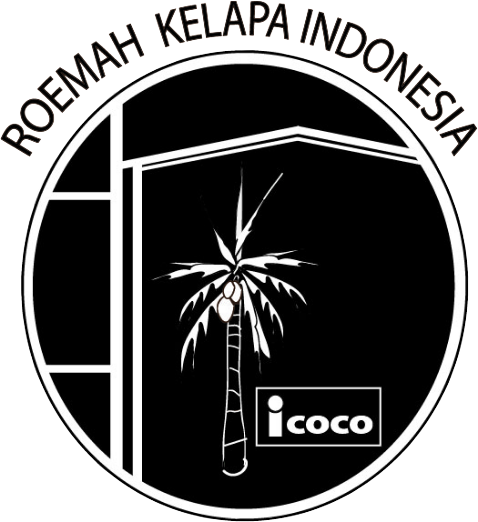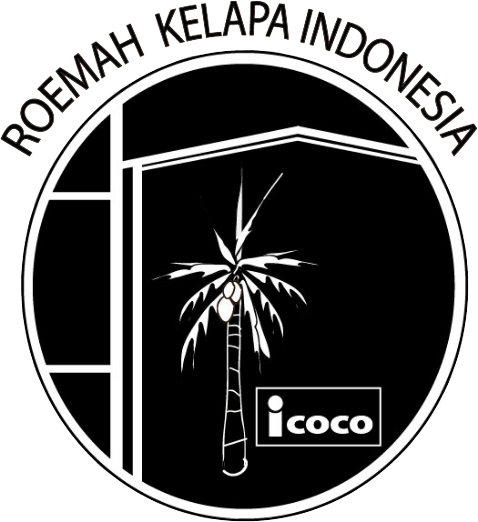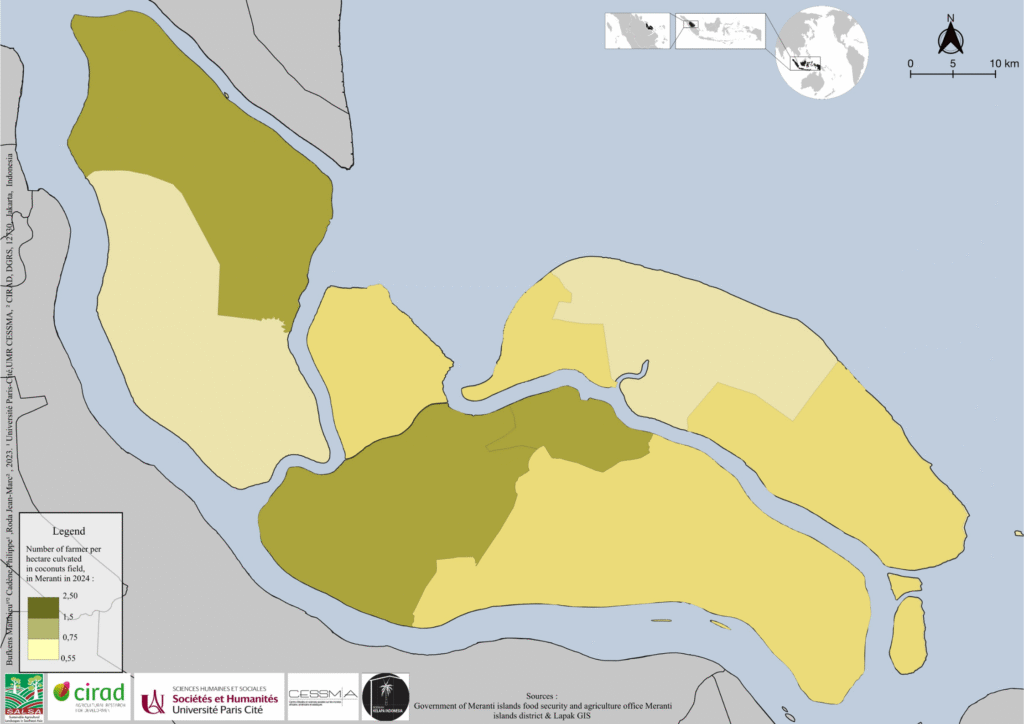

Roemah Kelapa Indonesia Group



OUR PROGRAM PRIORITIES
OUR PROGRAM PRIORITIES
DIGITAL AGRICULTURE
JOIN OUR TRANSFORMATION CHALLENGE
ESTABLISHING A PUSAT KULAKAN FIRST EVER AS A COCONUT TRADE CENTER – CTC
RoeKI’s Transformation Challenge is not just an initiative — it is a movement.
By aligning innovation, sustainability, and collaboration, we are building a coconut industry that is globally competitive, locally empowering, environmentally responsible, and fundamental to Indonesia’s long-term food sovereignty.
IMPLEMENTATION OF DIGITAL AGRICULTURE

DRIVING THE FUTURE OF COCONUT DEVELOPMENT FROM UPSTREAM TO DOWNSTREAM
The global coconut sector is at a critical turning point. Despite Indonesia being the world’s largest coconut producer, the industry continues to face fragmented value chains, low productivity at the farm level, inconsistent quality in processing, and under-optimized market access. Roemah Kelapa Indonesia (RoeKI) is taking on the Transformation Challenge – a bold, integrated initiative to reshape the coconut industry from upstream production to midstream processing and downstream value creation, ensuring sustainability, profitability, and inclusivity.
1. Upstream Transformation – Building Sustainable & Productive Coconut Farms
Current Challenge: Aging coconut trees, low farm productivity, and limited adoption of modern agronomy practices hinder farmers’ incomes and global competitiveness.
RoeKI Approach:
Implement replanting & rejuvenation programs with high-yield, climate-resilient varieties.
Introduce Good Agricultural Practices (GAP), digital farm management systems, and soil health restoration.
Integrate polyculture systems to diversify income and improve ecological balance.
Strengthen cooperative models to improve bargaining power and access to financing.
2. Midstream Transformation – Enhancing Processing & Value Retention
Current Challenge: Processing infrastructure is outdated or concentrated in limited areas, leading to inefficient conversion of raw materials and dependency on low-value bulk exports.
RoeKI Approach:
Develop integrated processing hubs capable of handling multiple coconut products (VCO, coconut water, copra, fiber, cocopeat, charcoal).
Adopt modern processing technologies for higher quality, efficiency, and traceability.
Ensure quality control & certification to meet premium market requirements.
Promote green processing practices, reducing waste and maximizing by-product utilization.
3. Downstream Transformation – Capturing Global Market Opportunities
Current Challenge: Indonesia exports most coconut products in raw or semi-processed form, losing the high-value market share to other countries.
RoeKI Approach:
Develop branded, consumer-ready products targeting health, wellness, and eco-conscious markets.
Expand into high-value niche segments such as nutraceuticals, plant-based beverages, organic beauty care, and eco-friendly materials.
Establish strategic partnerships with global distributors, e-commerce platforms, and sustainable supply chains.
Advocate for policy reforms & trade facilitation to strengthen Indonesia’s position in the global coconut economy.
The Transformation Impact
Through this Upstream–Midstream–Downstream transformation, RoeKI aims to:
Increase farmer incomes by 2–3x through productivity and market access improvements.
Boost Indonesia’s export value by transitioning from commodity-based trade to high-value finished goods.
Promote environmental sustainability through circular economy principles in coconut processing.
Empower local communities via skills training, entrepreneurship, and cooperative empowerment.
Advancing Food Sovereignty
Beyond economic and industrial gains, the RoeKI Transformation Challenge reinforces Indonesia’s food sovereignty. By revitalizing coconut farming and strengthening domestic processing capacity, Indonesia can:
Reduce dependency on imported vegetable oils and raw materials.
Secure a stable and sustainable supply of nutritious, locally produced coconut-based food products.
Enhance resilience against global market volatility and supply chain disruptions.
Strengthen national self-reliance in food production, ensuring that coconut—Indonesia’s heritage crop—remains a cornerstone of food security for generations to come.
FROM EXCELLENCE TO FARMER PROSPERITY - ALL IN ONE ROEMAH KELAPA INDONESIA
We are committed to uniting farmers, associations, industries, traders, government, and all stakeholders to ensure that every coconut within Indonesia’s integrated production zones is transformed into high-value products and derivatives—without a single part wasted. This embodies RoeKI’s vision of a fully integrated coconut industry: seamlessly connecting upstream and downstream sectors, operating on a zero-waste principle, and achieving complete energy self-sufficiency.
DIGITAL AGRICULTURE
JOIN OUR TRANSFORMATION CHALLENGE
ESTABLISHING A PUSAT KULAKAN FIRST EVER AS A COCONUT TRADE CENTER – CTC
RoeKI’s Transformation Challenge is not just an initiative — it is a movement.
By aligning innovation, sustainability, and collaboration, we are building a coconut industry that is globally competitive, locally empowering, environmentally responsible, and fundamental to Indonesia’s long-term food sovereignty.
IMPLEMENTATION OF DIGITAL AGRICULTURE

DRIVING THE FUTURE OF COCONUT DEVELOPMENT FROM UPSTREAM TO DOWNSTREAM
The global coconut sector is at a critical turning point. Despite Indonesia being the world’s largest coconut producer, the industry continues to face fragmented value chains, low productivity at the farm level, inconsistent quality in processing, and under-optimized market access. Roemah Kelapa Indonesia (RoeKI) is taking on the Transformation Challenge – a bold, integrated initiative to reshape the coconut industry from upstream production to midstream processing and downstream value creation, ensuring sustainability, profitability, and inclusivity.
1. Upstream Transformation – Building Sustainable & Productive Coconut Farms
Current Challenge: Aging coconut trees, low farm productivity, and limited adoption of modern agronomy practices hinder farmers’ incomes and global competitiveness.
RoeKI Approach:
Implement replanting & rejuvenation programs with high-yield, climate-resilient varieties.
Introduce Good Agricultural Practices (GAP), digital farm management systems, and soil health restoration.
Integrate polyculture systems to diversify income and improve ecological balance.
Strengthen cooperative models to improve bargaining power and access to financing.
2. Midstream Transformation – Enhancing Processing & Value Retention
Current Challenge: Processing infrastructure is outdated or concentrated in limited areas, leading to inefficient conversion of raw materials and dependency on low-value bulk exports.
RoeKI Approach:
Develop integrated processing hubs capable of handling multiple coconut products (VCO, coconut water, copra, fiber, cocopeat, charcoal).
Adopt modern processing technologies for higher quality, efficiency, and traceability.
Ensure quality control & certification to meet premium market requirements.
Promote green processing practices, reducing waste and maximizing by-product utilization.
3. Downstream Transformation – Capturing Global Market Opportunities
Current Challenge: Indonesia exports most coconut products in raw or semi-processed form, losing the high-value market share to other countries.
RoeKI Approach:
Develop branded, consumer-ready products targeting health, wellness, and eco-conscious markets.
Expand into high-value niche segments such as nutraceuticals, plant-based beverages, organic beauty care, and eco-friendly materials.
Establish strategic partnerships with global distributors, e-commerce platforms, and sustainable supply chains.
Advocate for policy reforms & trade facilitation to strengthen Indonesia’s position in the global coconut economy.
The Transformation Impact
Through this Upstream–Midstream–Downstream transformation, RoeKI aims to:
Increase farmer incomes by 2–3x through productivity and market access improvements.
Boost Indonesia’s export value by transitioning from commodity-based trade to high-value finished goods.
Promote environmental sustainability through circular economy principles in coconut processing.
Empower local communities via skills training, entrepreneurship, and cooperative empowerment.
Advancing Food Sovereignty
Beyond economic and industrial gains, the RoeKI Transformation Challenge reinforces Indonesia’s food sovereignty. By revitalizing coconut farming and strengthening domestic processing capacity, Indonesia can:
Reduce dependency on imported vegetable oils and raw materials.
Secure a stable and sustainable supply of nutritious, locally produced coconut-based food products.
Enhance resilience against global market volatility and supply chain disruptions.
Strengthen national self-reliance in food production, ensuring that coconut—Indonesia’s heritage crop—remains a cornerstone of food security for generations to come.
FROM EXCELLENCE TO FARMER PROSPERITY - ALL IN ONE ROEMAH KELAPA INDONESIA
We are committed to uniting farmers, associations, industries, traders, government, and all stakeholders to ensure that every coconut within Indonesia’s integrated production zones is transformed into high-value products and derivatives—without a single part wasted. This embodies RoeKI’s vision of a fully integrated coconut industry: seamlessly connecting upstream and downstream sectors, operating on a zero-waste principle, and achieving complete energy self-sufficiency.
DIGITALIZATION AT KULAKAN - CTC
DIGITALIZATION AT KULAKAN - CTC
Digitalization Needs for Modern Coconut Plantations and start by collecting all coconut at KULAKAN ROEKI
Digitizing Coconut Plantations for Transparency and Efficiency
Digitalization enables RoeKI to accurately count and standardize coconuts by categorizing them into seven predetermined quality grades. This process is carried out at designated coconut collection centers, known as kulakan kelapa, which operate as warehouse receipt facilities. These centers function as marketplace hubs where buyers and sellers meet.
Through the warehouse receipt model, farmers gain direct benefits by accessing open market prices based on the specific quality grade of their harvested coconuts. At the same time, buyers can secure coconuts that meet their exact quality and quantity requirements.
The integration of digital systems and data management ensures that every stakeholder — from farmers and buyers to government agencies — can access real-time information on volumes and prices. This transparency not only drives fairer trade but also fosters trust, efficiency, and market competitiveness across the coconut industry
To enhance the productivity, traceability, and sustainability of coconut plantations, a strategic shift toward digital agriculture is essential. Modern coconut farming requires integrated digital solutions that support decision-making from planting to post-harvest.
Key digitalization needs include:
GIS-based Plantation Mapping: For land profiling, productivity zoning, and monitoring of tree conditions.
Digital Farmer Database: To register and profile farmers, enabling personalized support, training, and input distribution.
Crop Monitoring Systems: Utilizing IoT sensors and drones to monitor plant health, soil moisture, and early pest detection.
Digital GAP Compliance Tools: Ensuring adherence to Good Agricultural Practices through checklists, mobile apps, and e-certification systems.
Supply Chain Traceability Platforms: From harvest to market, enabling product tracking and building consumer trust.
Digital Training & Extension Services: Using e-learning platforms, mobile apps, and remote advisory to scale farmer knowledge.
Financial Inclusion Tools: Mobile banking, digital payment, and farm record systems to support farmer financing.
Adopting these digital tools will position coconut plantations at the forefront of sustainable, efficient, and globally competitive agriculture.


Digitalization Needs for Modern Coconut Plantations and start by collecting all coconut at KULAKAN ROEKI
Digitizing Coconut Plantations for Transparency and Efficiency
Digitalization enables RoeKI to accurately count and standardize coconuts by categorizing them into seven predetermined quality grades. This process is carried out at designated coconut collection centers, known as kulakan kelapa, which operate as warehouse receipt facilities. These centers function as marketplace hubs where buyers and sellers meet.
Through the warehouse receipt model, farmers gain direct benefits by accessing open market prices based on the specific quality grade of their harvested coconuts. At the same time, buyers can secure coconuts that meet their exact quality and quantity requirements.
The integration of digital systems and data management ensures that every stakeholder — from farmers and buyers to government agencies — can access real-time information on volumes and prices. This transparency not only drives fairer trade but also fosters trust, efficiency, and market competitiveness across the coconut industry
To enhance the productivity, traceability, and sustainability of coconut plantations, a strategic shift toward digital agriculture is essential. Modern coconut farming requires integrated digital solutions that support decision-making from planting to post-harvest.
Key digitalization needs include:
GIS-based Plantation Mapping: For land profiling, productivity zoning, and monitoring of tree conditions.
Digital Farmer Database: To register and profile farmers, enabling personalized support, training, and input distribution.
Crop Monitoring Systems: Utilizing IoT sensors and drones to monitor plant health, soil moisture, and early pest detection.
Digital GAP Compliance Tools: Ensuring adherence to Good Agricultural Practices through checklists, mobile apps, and e-certification systems.
Supply Chain Traceability Platforms: From harvest to market, enabling product tracking and building consumer trust.
Digital Training & Extension Services: Using e-learning platforms, mobile apps, and remote advisory to scale farmer knowledge.
Financial Inclusion Tools: Mobile banking, digital payment, and farm record systems to support farmer financing.
Adopting these digital tools will position coconut plantations at the forefront of sustainable, efficient, and globally competitive agriculture.

